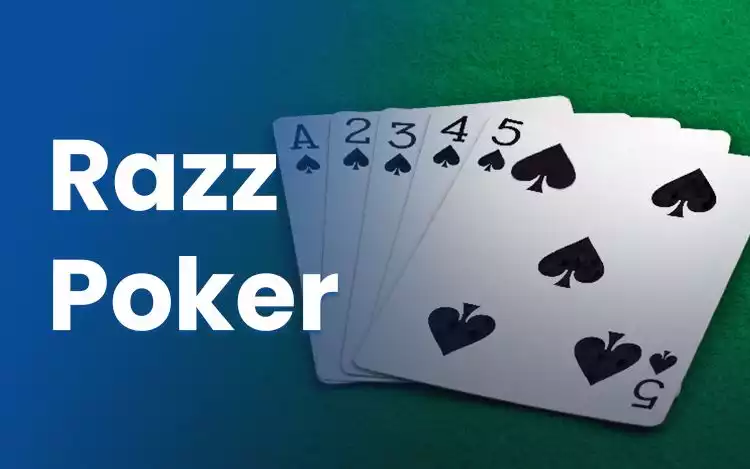Types of Poker
Poker is one of the most recognised and probably one of the most popular card games in the world thanks in part to its long and exciting history, presence in the media, such as in iconic movie scenes, and the growth of online poker. Part strategy, part skill, poker is a scintillating game that sees players aim to create the best hand or bluff their way into making the other players fold. Just as fun when played for a few pounds poker is a game that is accessible to all.
Thanks to the rise in the digital world, players can enjoy a huge range of poker types including niche variants from the comfort of their own home. However, sometimes too much choice can be a bad thing, especially for novices looking to start exploring the different types of poker card games. In today's article, we aim to clarify, explain, and explore the most popular different types of poker games which players enjoy at casinos including online and live versions. Keep on reading to learn more.
Popular Types of Poker
Almost all types of Poker can be broken down into three categories; community card Poker, Stud Poker, and Draw Poker. Let’s start our exploration into the types of Poker by examining the characteristics of these three categories.
Community Card Poker
Community Card Poker features cards that are dealt face up and placed in the centre of the table so that all players can see them. Each participant receives a private unfinished hand, consisting of "hole cards," in community card poker games. Players then put their hole cards together with the face-up community cards (also called window cards or sharing cards) to produce a complete hand.
The set of community cards, commonly known as the board, can be dealt in two ways: straightforward or according to a certain pattern. How these public cards can be mixed with the players' private hand will depend on the specific poker rules that apply to that particular game. The most popular Community Card Poker Variant is definitely Texas Hold’em, but you can discover the full range of titles in our Community Card Poker section.
Stud Poker
In Stud Poker players are dealt their hole cards face down, and will also be dealt face-up cards at various stages of play. Unlike Community Card Poker where all players share the face-up cards, though every player can see the face-up cards dealt to other players, they can only use the face-up cards they have been dealt (combined with their hole cards) to form their hand.
Stud Poker had its heyday in the 1920s-1950s, but the rise of more accessible real-world casinos and then online casinos saw Community Card Poker become the mainstream version. Stud Poker is most commonly played in 5-card and 7-card variants, but 6-card and 8-card variants exist too. By the conclusion of a regular five-card stud game, each player has four cards face up and one hole card face down. By the end of a standard seven-card stud game, each player has three hole cards and four face-up cards.
Stud Poker is incredibly beginner friendly making it a good place for casino newbies to start, you can check out our selection of Stud Poker games.
Draw Poker
Draw Poker is the name given to a number of popular poker variations in which players strive to build a stronger hand by discarding (removing) cards from their hands and drawing new ones. Five cards are usually given face down to each player in Draw Poker, though this may change depending on the variation. The most popular Draw Poker games are 5 Card Draw and 2-7 Triple Draw. In draw poker, players can swap or discard their cards during drawing rounds. How many times a player may draw is dependent upon the game's version. For instance, there is just one drawing round in the well-known 5-Card Draw game, but as the name implies, there are three drawing rounds in Triple Draw. As you can see, Draw Poker offers a gameplay experience vastly different to Stud and Community Card Poker. You can explore the Draw Poker Games.
Popular Community Card Poker Games
Community Card Poker is probably the most popular form of poker out there, and the one that we think of when we picture a poker game in our heads; largely due to the huge success of Texas Hold’em poker.
Omaha Poker
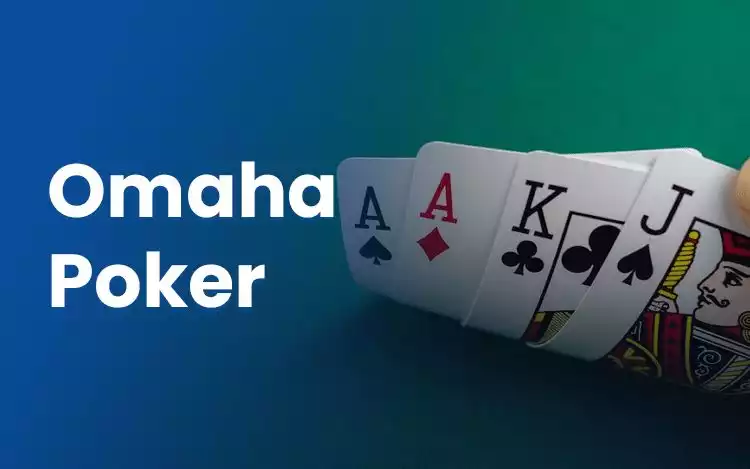 Texas Hold'em inspired the Community Card Poker game known as Omaha Poker. Four personal cards, sometimes known as "hole cards," are dealt to each player and are exclusive to that player. On the "board," (table) five communal cards are dealt face-up. In Omaha games, the greatest five-card poker hand is created by each player using exactly two of their hole cards and three of the community cards, with all other surplus cards being disregarded.
Texas Hold'em inspired the Community Card Poker game known as Omaha Poker. Four personal cards, sometimes known as "hole cards," are dealt to each player and are exclusive to that player. On the "board," (table) five communal cards are dealt face-up. In Omaha games, the greatest five-card poker hand is created by each player using exactly two of their hole cards and three of the community cards, with all other surplus cards being disregarded.
Omaha Hi/Lo Poker
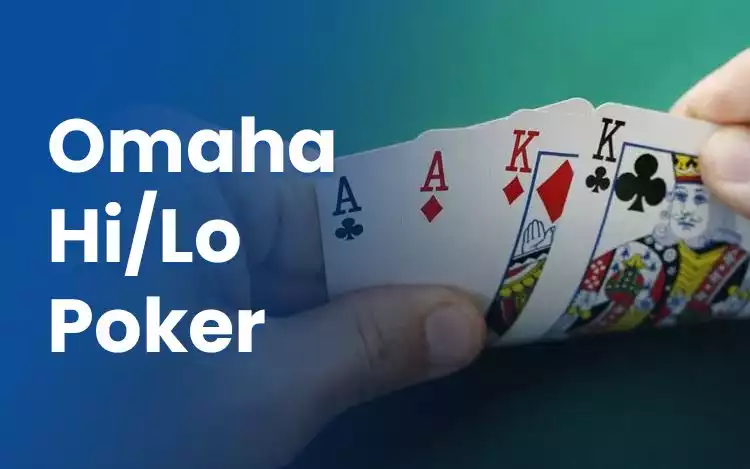 Omaha Hi/Lo (also known as "Omaha High Low," "Omaha H/L," "Omaha/8," or "Omaha 8-or-better") has grown incredibly popular due to its frequently enormous pots. In an Omaha Hi/Lo game, each player receives four personal cards, sometimes known as "hole cards," that are exclusive to them. On the "board," five communal cards are dealt face-up.
Omaha Hi/Lo (also known as "Omaha High Low," "Omaha H/L," "Omaha/8," or "Omaha 8-or-better") has grown incredibly popular due to its frequently enormous pots. In an Omaha Hi/Lo game, each player receives four personal cards, sometimes known as "hole cards," that are exclusive to them. On the "board," five communal cards are dealt face-up.
To create the finest five-card poker hand possible, each player uses exactly two of their four-hole cards together with exactly three cards from the board. Omaha Hi/Lo gets its name from the division of the pot between the best hands for high and low. To create your high hand and low hand, you can mix and match any two cards from your hand; however, you can only use exactly two cards from your hand and three cards from the board in each hand.
Omaha Hi/Lo is played with an "8-or-better" qualifier, meaning that in order to win the low portion of the pot, a low hand must include five separate cards that are ranked eight or lower. Omaha Hi/Lo ranks low hands using the "Ace to Five" or "California" system.
Texas Hold 'em
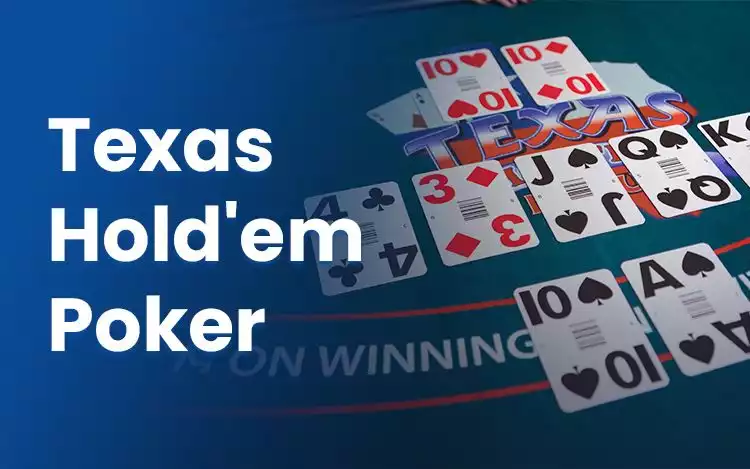
The most played type of poker is Texas Hold'em. Every major poker event in the world, including the World Series of Poker, offers this game in a no-limit format. In this community card poker variation, players compete to construct the greatest five-card hand out of the seven cards that are handed to them.
Texas Hold’em and a popular Stud Poker variant called Seven-Card Stud are comparable. Nevertheless, each player's hand consists of a set of two cards dealt facedown to them alone, which can be combined with five cards dealt faceup that all players may use, rather than utilising an exclusive set of seven playing cards to build the best hand.
In Texas Hold'em each stage where community cards are dealt has a different name. The first three dealt is the 'flop', the fourth card dealt is 'the turn', and the fifth and final card dealt is called the 'river'.
Popular Stud Poker Games
As mentioned earlier, Five-Card Stud Poker is one of the most common types of poker games within the ‘Stud’ Category. Other common variants you may come across include the following:
Seven Card Stud Poker
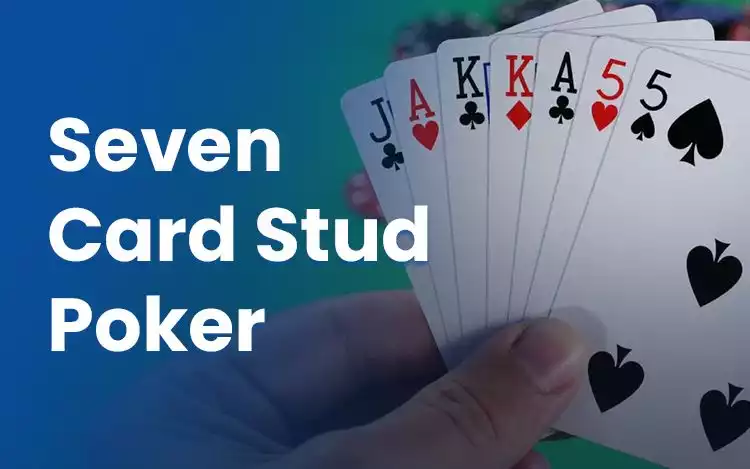
7 Card Stud was the most popular poker game in the world prior to Texas Hold'em's explosive global rise. Each and every professional poker player in the world was well-versed in the game. A seven-card stud game is comparable to a five-card draw game, with the exception that each player is given seven cards at the beginning of the game. It is also occasionally referred to as "Typical Stud" poker. Out of the seven cards initially dealt, four are faceup cards and three are facedown cards. In a game of seven-card stud, each player must use five of their seven cards to form the highest-ranking hand. The winner is the player with the best hand.
Razz Poker
Razz is a poker type inspired by 7-Card Stud where the player with the best Ace to Five low hand at showdown wins the pot. In Razz, each player receives seven cards during the course of the hand; however, the winner is only determined by the player with the best five-card low hand. It should be noted that there is no "eight or better" criterion to win the pot in Razz, in contrast to Seven Card Stud Hi/Lo or Omaha Hi/Lo.
Razz ranks low hands using the "Ace to Five" or "California" system. Since aces are always low and straights and flushes do not count against a hand, the greatest possible hand is a "wheel" consisting of 5, 4, 3, 2, and A.
Caribbean Stud Poker
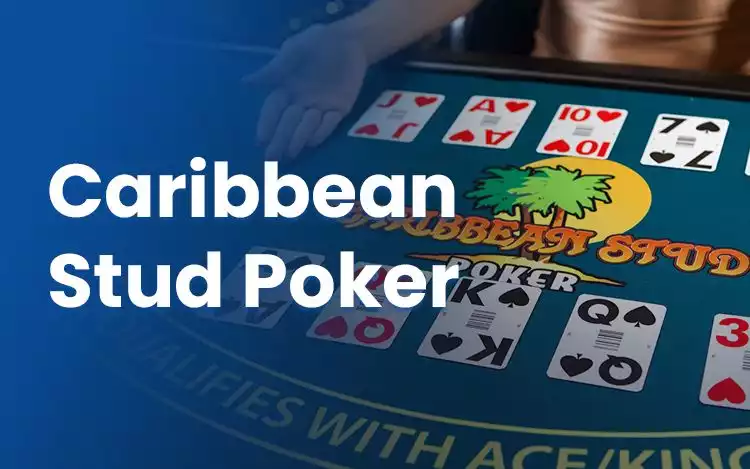
Since Caribbean Stud is a casino poker game, your goal is to beat the dealer rather than the other players at the table. Similarly, the payouts for Caribbean Stud Poker are set based on the size of your wager.
In the 1980s, Caribbean Stud Poker was developed with the goal of bringing the excitement of poker to a quick-play casino table game that could compete with games like baccarat and blackjack by having similar payout odds and play speeds. To play, players simply need to know a few fundamentals, including poker hand ranks, and they don't need to be experts in poker strategy.
Popular Draw Poker Games
5 Card Draw Poker
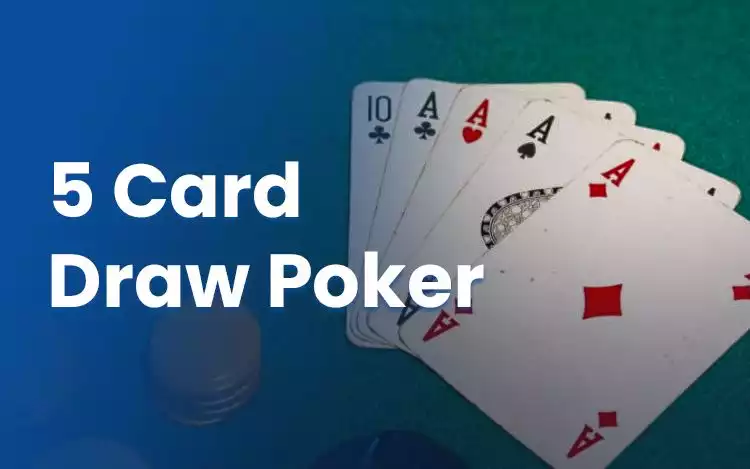
Five-card Draw (also known as Cantredraw) is a draw poker variant that is regarded as the simplest variant of poker and also forms the basis of many video poker games. In a five-card draw poker game, each participant is initially given five cards (hence the name). The hand rankings used in Texas Hold'em are also used in this game, and it is played with a standard 52-card deck.
Mixed Poker Games
Mixed Poker Games are those where multiple variants of poker are played within one session in rotation. This is often done as part of a tournament, where players test their mettle across the challenges posed by the many poker variants, encompassing Community Card, Stud, and Draw Poker types. Popular examples of a mixed poker game lineup include:
H.O.R.S.E. (Hold’em, Omaha Hi, Razz, Stud, Eight or Better Stud)
8-Game Mix (same as HORSE plus No Limit Hold’em, Pot Limit Omaha, and 2-7 Triple Draw)
Best Online Casino Sites to Play Poker
Gambling Zone recommends the following top online casino sites which offer a broad range of different types of poker games:
Genting Casino

Get a 100% Bonus
Up to £25 + 50 Free Spins
on Big Bass Bonanza
Grosvenor Casino

New Players
Deposit £20
Play with £40
Prime Casino

Get 100% Bonus
up to £25
+ 50 Free Spins on Big Bass Bonanza
Types of Poker Final Thoughts
One of the best things about online gaming is that players have a huge range of choices, able to access a broad variety of the most popular, and more niche variations such as those discussed in this article with a few clicks of a mouse or taps of a screen. Poker can also be presented in many forms no longer simply at brick-and-mortar casinos or part of tournaments, with online and live casino variants to explore.
With so much choice and so much excitement, it can be easy to get swept up in things, but remember; poker can be just as fun when played for a few quid between mates at home, as it can within a casino setting. Always remember to gamble responsibly, never wager more than you can afford to lose, set a budget and time limit for your session, and when the fun stops; stop.